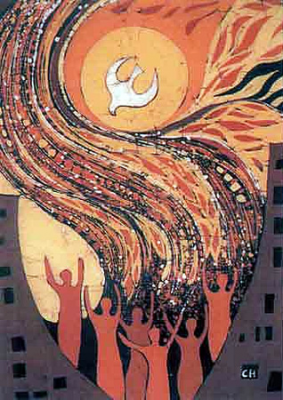 The gospel for today is part of a longer section of John’s Gospel known by various names, but is easily understood and seen as a final farewell to His disciples as his arrest in Gethsemane is lingering on the horizon. It has formed the daily gospels for a while now. This “Farewell Discourse” has distinct components. First, Jesus tells the disciples that he will be going away to the Father, that he will send the Holy Spirit to guide the disciples. Jesus bestows peace on the disciples and commands them to love one another. The expression of the unity of love between Jesus and his Father, in the Spirit, as it applies to His disciples in the love of Christ, is a key theme in the discourse, manifested by several reiterations of the New Commandment: “love one another as I have loved you.”
The gospel for today is part of a longer section of John’s Gospel known by various names, but is easily understood and seen as a final farewell to His disciples as his arrest in Gethsemane is lingering on the horizon. It has formed the daily gospels for a while now. This “Farewell Discourse” has distinct components. First, Jesus tells the disciples that he will be going away to the Father, that he will send the Holy Spirit to guide the disciples. Jesus bestows peace on the disciples and commands them to love one another. The expression of the unity of love between Jesus and his Father, in the Spirit, as it applies to His disciples in the love of Christ, is a key theme in the discourse, manifested by several reiterations of the New Commandment: “love one another as I have loved you.”
The next part of the discourse contains the allegory of the Vine and the Branches which portrays Jesus as the source of life for the world and the disciples as the branches, building on the pattern of discipleship in the gospels. The Vine again emphasizes the love among the disciples and exhorts them to remain connected to Christ in their ministry and all that they do. In this section Jesus then warns the disciples of upcoming persecutions.
In the final part of the discourse (John 17:1-26) Jesus prays for his followers and the coming Church. This is the longest prayer of Jesus in any of the gospels, and is known as the High Priestly Prayer. The key themes of the prayer are the glorification of the Father and petitions for the unity of the disciples through love. Jesus prays to the Father that his followers may be one and love as the Father loves.
Our gospel is between the High Priestly Prayer and the Vine and the Branches. Moving from the warning of persecutions, Jesus lets the Apostles know they will not be alone in their struggles. He will send them the Spirit, who will supply their needs abundantly. The Spirit has already been described as Helper, Advocate and Prosecutor (convicting sinful people of being in the wrong) and now Jesus introduces a new role: “But when he comes, the Spirit of truth, he will guide you to all truth” (John 16:13)
Imagine yourself as one of the disciples. Everything Jesus has been saying is like one gut punch after another. The One thought to be Savior and Lord – and intimately known as friend – is leaving, but to them it likely feels like abandonment. Jesus is giving them instructions, wisdom, encouragement – but who can absorb it all? Jesus lets them know it will be OK. Even if they missed everything He said, the Spirit of Truth will come to guide them; to guide them, to help them remember.
The Spirit’s work in this role is to guide the followers of Jesus into “all truth.” As the days go by, the Spirit will lead them deeper and deeper into the knowledge of truth. In passing we should notice that the attempt of some scholars to “go back to the original Jesus” and bypass the teaching of the apostles is shown by Jesus himself to be misguided. The same source lies behind both. The Spirit’s teaching is not from himself, but he teaches “only what he hears.”
“He will glorify me, because he will take from what is mine and declare it to you.” (John 16:14) The work of the Spirit is Christocentric. He will draw attention not to himself, but to Christ. He will glorify Christ. It is the things of Christ that the Spirit takes and declares, that is, the ministry is built upon and is the necessary sequel to that of Christ.
The Spirit has been given: in the Upper Room, the Johannine Pentecost, the public Pentecost, the Sacraments, prayer, and more. So, when you find yourself in times of trouble, when you’re confused, flummoxed and distressed – take a deep breath. The Apostles were there before you. Jesus’ message to them was to take a deep breath and allow the Spirit to guide you to all Truth. Let the Spirit do his job!